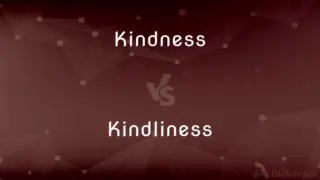Pooed vs. Pood — What's the Difference?
By Tayyaba Rehman & Maham Liaqat — Updated on April 25, 2024
"Pooed" is the past tense of "poo," referring to the act of defecation, while "pood" is an obsolete unit of weight used in Russia.

Difference Between Pooed and Pood
Table of Contents
ADVERTISEMENT
Key Differences
"Pooed" is a verb that describes the action of defecating. It is commonly used in informal contexts, particularly in British English. On the other hand, "pood" is a term from historical Russian measurement systems, specifically referring to a unit of weight roughly equivalent to 16.38 kilograms or 36.11 pounds.
When someone says they "pooed," they are indicating that they have excreted waste from their body. Whereas, if someone mentions a "pood," they could be referring to the historical weight of an object, especially in contexts involving old Russian texts or discussions of historical weights and measures.
The use of "pooed" is widespread in everyday language, particularly in discussions about health or child care. In contrast, "pood" is rarely used today except by historians, weightlifters, or enthusiasts of Russian culture and history who have an interest in traditional units of measurement.
Both terms serve very different functions: "pooed" is action-oriented and biological, while "pood" is static and historical, related to the quantification of mass in former times.
Understanding these terms is important for clear communication—knowing that "pooed" relates to a natural bodily function, while "pood" involves the historical and cultural context of measurement.
ADVERTISEMENT
Comparison Chart
Definition
Past tense of poo, meaning to defecate
A historical unit of weight in Russia
Usage
Informal, related to bodily functions
Historical, related to weight measurement
Context
Everyday language, health, child care
History, weightlifting, Russian culture
Function
Verb, describes an action
Noun, describes a measurement unit
Relevance
Common in modern usage
Rare, mostly of historical interest
Compare with Definitions
Pooed
Act of passing stool.
He pooed quickly before returning to the meeting.
Pood
Historical Russian weight unit.
The old kettlebell was exactly one pood in weight.
Pooed
To have excreted waste from the body.
The puppy pooed in the park during its walk.
Pood
Obsolete measurement of mass.
Museums display weights that are labeled in poods.
Pooed
To have defecated.
The baby pooed right after feeding.
Pood
Unit of measurement equivalent to about 16.38 kilograms.
He lifted a weight of two poods at the competition.
Pooed
Informal term for defecation.
She realized that the toddler had pooed when she smelled something foul.
Pood
Used in the context of historical weight measurement.
The grain was traditionally sold by the pood.
Pooed
Completed the act of defecation.
He was relieved to have finally pooed after feeling unwell.
Pood
Traditional Russian weight measure.
Recipes from the 19th century sometimes used poods as a measure for ingredients.
Pooed
To defecate.
Pood
Pood (Russian: пуд, tr. pud, IPA: [put], plural: pudi or pudy) is a unit of mass equal to 40 funt (фунт, Russian pound).
Pooed
To defecate in (one's pants or bed).
Pood
A Russian unit of weight, equal to 40 funt (Russian pounds) and equivalent to 16.4 kg (36 lb) approx.
Pooed
Excrement.
Pood
A Russian unit of weight equivalent to about 16.4 kilograms (36.1 pounds) avoirdupois.
Pooed
An act of defecating.
Pood
An obsolete Russian unit of mass, equal to 40 Russian funt, or about 16.38 kg (approximately 36.11 pounds).
Pooed
Simple past tense and past participle of poo
Pood
A Russian unit of mass used for kettlebells, now rounded off to 16 kg (about 35.274 pounds).
Pood
A Russian weight, equal to forty Russian pounds or about thirty-six English pounds avoirdupois.
Pood
A Russian unit of weight equal to approximately 36 pounds
Common Curiosities
What does "pooed" mean?
It means to have defecated.
Is "pooed" a formal term?
No, it is an informal term used to describe defecation.
What is a "pood"?
It is an old Russian unit of weight equivalent to about 16.38 kilograms.
Can "pood" be used in modern measurements?
It is largely obsolete and of historical interest.
Why is "pooed" commonly used in child care?
It is a less formal way to discuss the bowel movements of children.
Is there a plural form for "pood"?
Yes, the plural can be "poods."
How do caregivers track if a baby "pooed"?
Through regular diaper checks.
How heavy is one pood in modern terms?
One pood is approximately 36.11 pounds.
Where might one encounter the term "pood" today?
In historical texts, museums, or specific sports like kettlebell lifting.
Why is understanding "pooed" important in healthcare?
It helps in monitoring bowel health and functionality.
Share Your Discovery

Previous Comparison
Kindness vs. Kindliness
Next Comparison
Ogre vs. OrcAuthor Spotlight
Written by
Tayyaba RehmanTayyaba Rehman is a distinguished writer, currently serving as a primary contributor to askdifference.com. As a researcher in semantics and etymology, Tayyaba's passion for the complexity of languages and their distinctions has found a perfect home on the platform. Tayyaba delves into the intricacies of language, distinguishing between commonly confused words and phrases, thereby providing clarity for readers worldwide.
Co-written by
Maham Liaqat











































